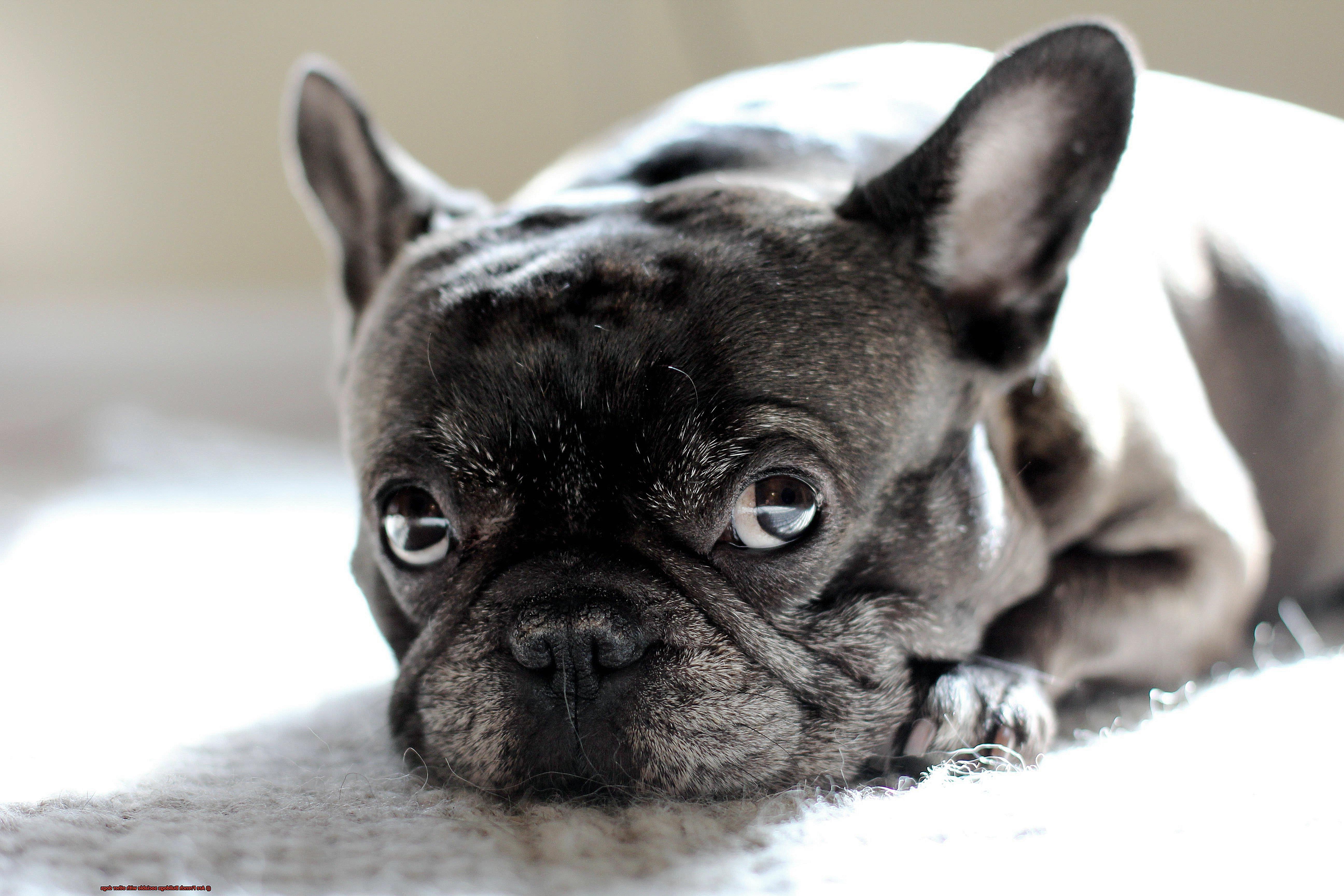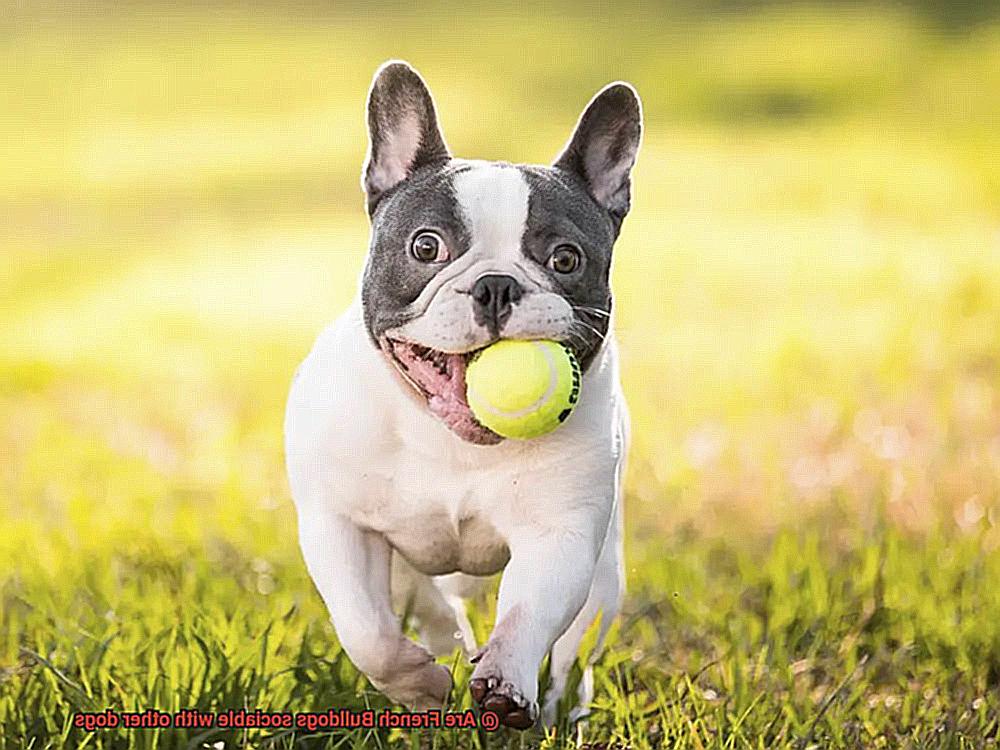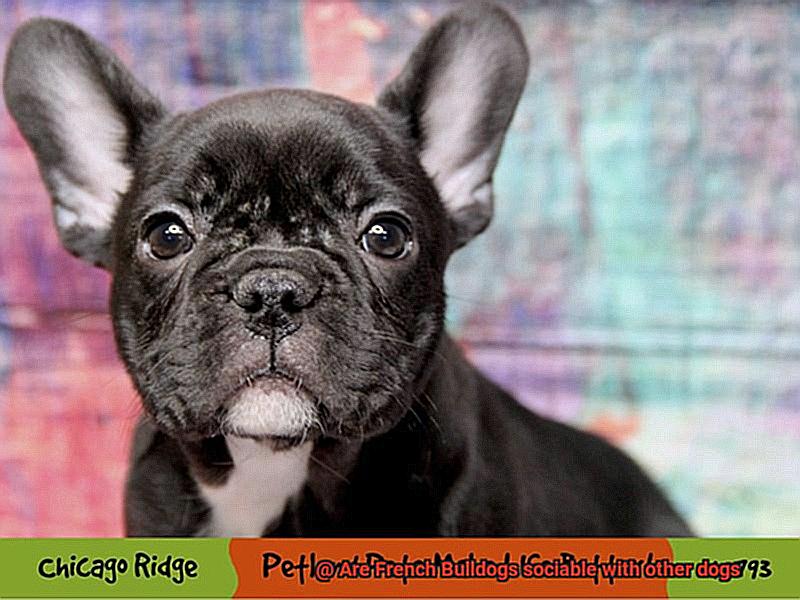Are French Bulldogs sociable with other dogs?
Step right into our blog post, where we’re about to dive deep into the captivating world of French Bulldogs and their social skills with other four-legged friends.
Got your eye on one of these adorable pups? Curious if they’re natural social butterflies or prefer to fly solo?
Well, fret not. We’ve got all the juicy deets to satisfy your curiosity.
So, without any more dilly-dallying, let’s get down to business and answer the burning question: Are French Bulldogs sociable with other dogs?
Are French Bulldogs sociable with other dogs
Contents
- 1 Are French Bulldogs sociable with other dogs
- 2 The Role of Early Socialization in French Bulldog Sociability
- 3 Training to Encourage Positive Interactions with Other Dogs
- 4 Are All French Bulldogs Sociable with Other Dogs?
- 5 Understanding the Unique Personality Traits of French Bulldogs
- 6 Common Behaviors Exhibited by Sociable French Bulldogs Around Other Dogs
- 7 How to Introduce a French Bulldog to a New Dog
- 8 Tips for Managing Territorial or Protective Tendencies in French Bulldogs
- 9 Creating an Environment for Positive Interactions between French Bulldogs and Other Canines
- 10 Conclusion
French Bulldogs are beloved for their friendly and sociable nature, making them great companions for humans. However, when it comes to interacting with other dogs, their behavior can vary. In this blog post, we will explore the factors that influence a French Bulldog’s sociability with other dogs and provide insights to help you navigate social interactions with your furry friend.
Factors Influencing Sociability:
Individual Personality and Temperament:

Just like humans, dogs have unique personalities. Some French Bulldogs may naturally enjoy the company of other dogs and exhibit a friendly disposition. Others may be more reserved or prefer human companionship. Recognizing and respecting your dog’s personality traits is essential for successful interactions with other dogs.
Early Socialization:
Early socialization experiences between 3 to 14 weeks of age play a crucial role in shaping a French Bulldog’s behavior towards other dogs. Positive experiences during this critical period can help them develop good social skills and comfort around fellow canines. Lack of exposure or negative experiences can lead to fear or aggression towards unfamiliar dogs.
Training and Proper Socialization:
Investing time and effort into training your French Bulldog is key to fostering positive interactions with other dogs. Teaching basic obedience commands like “sit,” “stay,” and “leave it” helps establish control during encounters. Exposing them to various socialization opportunities, such as supervised playdates or obedience classes, builds confidence and positive associations with other dogs.

Personal Preferences:
Just like humans, dogs have preferences when it comes to social interactions. Some French Bulldogs may have specific preferences or dislikes based on factors such as size, energy level, or breed of other dogs they encounter. Being mindful of your dog’s individual preferences ensures comfortable and enjoyable interactions for both parties involved.
The Role of Early Socialization in French Bulldog Sociability
French Bulldogs are known for their friendly and affectionate nature, but just like any other dog breed, proper socialization during their early stages is crucial to ensure they develop positive behaviors and interactions with other dogs. In this section, we will explore the role of early socialization in shaping the sociability of French Bulldogs, providing you with tips and insights to help your furry friend become a social butterfly.
Start Early:
Early socialization should begin as soon as possible, ideally between the ages of 8 to 16 weeks, when puppies are most receptive to learning and adapting to new experiences. This critical period allows French Bulldogs to form positive associations with other dogs, setting the stage for a lifetime of healthy social interactions.
Exposure to Different Dogs:
During this crucial stage, it is important to expose French Bulldog puppies to a variety of different dogs in terms of size and temperament. This exposure helps them develop appropriate social skills, learn how to communicate effectively, and understand doggie body language. By interacting with dogs of different sizes and temperaments, French Bulldogs can learn to adapt their behavior accordingly, reducing the likelihood of aggression or fear-based behaviors later in life.
Controlled Environments:
To ensure safe and positive interactions, it is recommended to introduce your French Bulldog puppy to other well-socialized dogs in controlled and supervised environments. Puppy classes or playdates with trusted friends or family members’ dogs can provide valuable opportunities for socialization. These controlled environments allow for guidance and intervention from experienced trainers or owners, ensuring that interactions are positive and constructive.
Exposure to Different Environments:
Socialization should not be limited to interactions with other dogs alone. It is equally important to expose French Bulldogs to different environments, sounds, and stimuli. By exposing them to various situations early on, such as walks in busy streets or visits to parks, you can help them become well-rounded and confident in different settings. This exposure helps prevent fear or anxiety-related behaviors in unfamiliar environments.
Positive Reinforcement:
During socialization sessions, it is essential to use positive reinforcement techniques to reward desired behavior. Treats, praise, and affection can reinforce positive interactions and help French Bulldogs understand what behavior is expected of them. By associating positive experiences with socialization, they will be more motivated to engage in friendly and sociable behaviors.
Consistency and Ongoing Socialization:
Consistency and repetition are key during the socialization process. Regular exposure to other dogs and positive experiences will help solidify sociability traits in French Bulldogs. However, it is important to note that early socialization is just the beginning. Ongoing socialization throughout a French Bulldog’s life is equally important to maintain their positive interactions with other dogs.
Training to Encourage Positive Interactions with Other Dogs
French Bulldogs are known for their friendly and affectionate nature, but not all of them are naturally sociable with other dogs. With the right training and socialization techniques, you can help your French Bulldog develop positive interactions with fellow furry friends. In this blog post, we will explore the importance of early socialization, positive reinforcement, controlled introductions, consistency, and understanding your dog’s individual temperament when training French Bulldogs to interact positively with other dogs.
Early Socialization:
- Start socializing your French Bulldog from a young age to expose them to various canine experiences.
- Introduce your pup to different breeds and sizes of dogs, helping them develop essential social skills.
- Organize playdates or visit dog parks to give your French Bulldog ample opportunities for positive interactions.
Positive Reinforcement:
- Use reward-based training methods like treats or praise to reinforce desired behaviors.
- Reward your French Bulldog immediately when they display calmness and friendliness towards other dogs.
- Positive reinforcement helps them associate good behavior with rewards, motivating them to continue behaving well in future interactions.
Controlled Introductions:
- Gradually introduce your French Bulldog to other dogs in a controlled environment.
- Choose neutral territory or familiar spaces for introductions to ensure comfort for both dogs.
- Allow the dogs to sniff each other while on leash and observe their body language for signs of stress or aggression.
- Increase the duration and intensity of interactions gradually under close supervision.
Consistency:
- Set aside dedicated training time each day to work on socialization exercises with your French Bulldog.
- Regular practice sessions reinforce desired behaviors and help them become ingrained habits.
- Consistency helps your dog understand expectations and reinforces their ability to interact appropriately with other dogs.
Understanding Individual Temperament:
- Respect and understand your French Bulldog’s individual temperament.
- Not all French Bulldogs will become best friends with every dog they encounter, and that’s normal.
- Focus on helping your French Bulldog coexist peacefully and engage in polite interactions when encountering other dogs.

Are All French Bulldogs Sociable with Other Dogs?
French Bulldogs are known for their friendly and sociable temperament, but it is important to note that not all French Bulldogs will be equally comfortable or friendly towards other dogs. Just like humans, dogs have their own personalities and preferences when it comes to social interactions. In this article, we will explore the factors that can influence a French Bulldog’s sociability with other dogs.
- Genetics: The genetic makeup of a French Bulldog can play a role in their sociability with other dogs. Some French Bulldogs may have a predisposition towards being more sociable and comfortable around other dogs, while others may be more reserved or even exhibit signs of aggression or fear. It is important to remember that genetics is just one factor and does not determine a dog’s behavior entirely.
- Early socialization experiences: Early socialization is crucial for shaping a French Bulldog’s behavior towards other dogs. Exposing them to positive experiences with different dogs from a young age can help them develop good social skills and increase their likelihood of being sociable with other dogs in adulthood. This can include puppy classes, playdates, and controlled interactions with well-behaved dogs.
- Individual temperament: Each French Bulldog has its own unique temperament and preferences. Some French Bulldogs may simply prefer human companionship over that of other dogs, while others may thrive in multi-dog households and enjoy regular playdates with their furry friends. It is important to respect and understand your individual dog’s preferences when it comes to social interactions.
- Training and ongoing socialization: Proper training and ongoing socialization throughout a French Bulldog’s life can significantly impact their ability to get along with other dogs. Training should focus on teaching them appropriate social behaviors, impulse control, and how to communicate effectively with other dogs. Regular exposure to different dogs in a controlled and positive environment can also help reinforce positive social behaviors.
- Body language and signs of discomfort: It is essential for French Bulldog owners to be aware of their dog’s body language and signs of discomfort or fear when interacting with other dogs. Some signs of discomfort include stiff body posture, growling, snapping, or attempting to hide. If a French Bulldog consistently shows signs of aggression or fear towards other dogs, it is important to seek professional help from a certified dog trainer or behaviorist who can provide guidance on managing and modifying their behavior.
Understanding the Unique Personality Traits of French Bulldogs
French Bulldogs are adored by many for their unique personalities and charm. If you’re a proud owner of a French Bulldog or considering getting one, understanding their distinct personality traits is essential for fostering strong bonds and harmonious social interactions. In this comprehensive guide, we’ll delve into the fascinating world of French Bulldog personalities and how they influence their sociability with other dogs.
Affectionate Nature:
French Bulldogs are renowned for their loving and loyal nature. They form deep connections with their owners, and this affection often extends to other dogs as well. Their natural sociability makes them generally friendly and eager to engage in play and social interactions with fellow canines.
Individual Differences:
While French Bulldogs typically have sociable tendencies, it’s crucial to remember that each dog possesses its own unique personality. Some may display more reserved or aloof behavior towards other dogs due to various factors such as genetics or past experiences. It’s important to respect your French Bulldog’s individuality and provide them with the space they need to feel comfortable in social situations.
Adaptability and Easygoing Nature:

French Bulldogs are known for their adaptability, making them more inclined to be sociable with other dogs. Their laid-back demeanor allows them to effortlessly adjust to different living situations and make new friends. This quality makes them a great companion for both humans and other canines.

Preference for Human Attention:
Although French Bulldogs enjoy the company of fellow dogs, their primary focus is usually on their human family members. These affectionate pups thrive on human companionship, which can sometimes overshadow their desire to socialize extensively with other dogs. However, with proper socialization, they can develop positive social skills and enjoy meaningful interactions with their canine peers.
Common Behaviors Exhibited by Sociable French Bulldogs Around Other Dogs
These charismatic canines have an innate ability to charm their way into the hearts of both humans and fellow four-legged friends. In this blog post, we will explore the common behaviors exhibited by sociable French Bulldogs around other dogs, providing insights and tips for French Bulldog owners looking to foster positive social interactions.
Playfulness:
French Bulldogs are notorious for their playful nature, and when it comes to interacting with other dogs, they are no exception. They engage in delightful games of chase, engaging in friendly wrestling matches, and even demonstrating their playful spirit through a classic play bow – an invitation for fun-filled adventures.
Friendliness:
With their wagging tails and open body language, sociable French Bulldogs exude friendliness when approaching other dogs. Their warm and welcoming demeanor signals a desire to make new furry friends, instantly putting everyone at ease.
Social Skills:
Sociable French Bulldogs possess an uncanny ability to decipher the subtle cues and body language of other dogs. This skill allows them to respond appropriately, avoiding conflicts and fostering harmonious interactions. Their astuteness in reading signals ensures that they navigate social situations with grace and ease.
Group Activities:
These social butterflies thrive in group settings. Sociable French Bulldogs find immense joy in participating in group activities like going for walks or enjoying playtime at the dog park. These social outings provide the perfect opportunity for them to bond with their canine companions, reinforcing their sociability.
Submissive Behaviors:
In the presence of other dogs, sociable French Bulldogs may exhibit submissive behaviors as a sign of respect and non-aggression. Rolling onto their back, exposing their belly, or licking the face of other dogs are common gestures that indicate their willingness to maintain peace and harmony.
How to Introduce a French Bulldog to a New Dog
Bringing a new dog into your home can be an exciting but nerve-wracking experience, especially when you already have a lovable French Bulldog. To ensure a smooth introduction and foster a positive relationship between the two dogs, it’s important to take things slow and create a controlled and calm environment. In this article, we will explore some helpful tips on how to introduce a French Bulldog to a new dog.
Choose the Right Environment:
Selecting a neutral and controlled environment for the introduction is crucial. A park or a backyard can provide ample space for both dogs to explore without feeling territorial. Avoid introducing them in your French Bulldog’s usual territory to prevent any potential conflicts.
Familiarize with Scents:
Before the actual meeting, allow both dogs to become familiar with each other’s scent by exchanging blankets or toys. This can help ease their anxiety and create a sense of familiarity before they physically meet.
Leash Up:
During the initial introduction, keep both dogs on leashes and maintain a safe distance between them. This allows you to have control over the situation and intervene if necessary. Observe their body language closely for signs of aggression or fear.
Gradual Decrease in Distance:
As the dogs show positive body language and calm behavior, gradually decrease the distance between them while remaining vigilant. Use treats and praise as positive reinforcement for calm and friendly behavior.
Seek Professional Help if Needed:
If any signs of aggression or discomfort persist, it may be necessary to seek professional help from a dog trainer or behaviorist. They can provide guidance on how to manage and address any behavior issues that arise during the introduction process.
Individual Attention:
As you continue to introduce the new dog to your French Bulldog, make sure to give each dog their own space and individual attention. This prevents jealousy or competition and helps them feel secure in their own territories.
Tips for Managing Territorial or Protective Tendencies in French Bulldogs
French Bulldogs are known for their affectionate nature, but like any other dog breed, they can display territorial or protective behaviors. These tendencies can sometimes lead to aggression towards other dogs, making it essential for owners to manage them effectively. In this article, we will discuss tips for managing territorial or protective tendencies in French Bulldogs.
Proper Socialization:
Early socialization is crucial in helping French Bulldogs develop positive behaviors towards other dogs. Expose them to various situations, environments, and other dogs from a young age. Gradually increase the intensity of these interactions and provide positive reinforcement to help them become more sociable.
Training:
Basic obedience training is essential in managing territorial or protective tendencies. Teach commands like “sit,” “stay,” and “leave it” to establish control over their behavior. Additionally, a reliable recall command can redirect their attention from potential triggers or conflicts.
Stay Calm and Assertive:
When addressing territorial or protective behaviors, remain calm and assertive. Reacting with anger or frustration can escalate the situation and reinforce negative behaviors. Instead, use positive reinforcement techniques such as rewarding calm and non-aggressive behavior.
Provide Mental and Physical Stimulation:
French Bulldogs need plenty of mental and physical stimulation to channel their energy positively. Regular exercise, interactive toys, and engaging activities can help reduce territorial or protective tendencies.
Seek Professional Help if Needed:
In severe cases where managing these tendencies becomes challenging, seek professional help from a dog trainer or behaviorist. They can provide personalized guidance tailored to your French Bulldog’s specific needs.
Creating an Environment for Positive Interactions between French Bulldogs and Other Canines

French Bulldogs are known for their friendly and sociable nature, making them great companions for both humans and other dogs. However, it is important to create a positive environment for interactions with other canines to ensure a harmonious relationship.
In this blog post, we will explore the importance of proper socialization, positive reinforcement training, monitoring body language, providing exercise and mental stimulation, supervision, and respecting individual differences.
Early Socialization:
Early socialization plays a vital role in shaping a French Bulldog’s behavior towards other dogs. By exposing them to different dogs and situations from a young age, you can help them develop good social skills. Consider enrolling your French Bulldog in puppy socialization classes or organizing playdates with well-behaved dogs. Supervised interactions in controlled environments can also help ensure positive experiences.
Positive Reinforcement Training:
Using positive reinforcement techniques is an effective way to encourage friendly behavior in French Bulldogs during interactions with other dogs. Rewarding them for calm and appropriate behavior reinforces positive associations and encourages them to continue displaying friendly behavior.
Monitoring Body Language:
Understanding canine body language is essential in preventing conflicts and ensuring safe interactions. Pay close attention to the body language of both your French Bulldog and the other dog during interactions. Signs of stress or discomfort, such as stiff body posture or growling, should be taken seriously, and the interaction should be interrupted if necessary.

Providing Exercise and Mental Stimulation:
French Bulldogs require regular physical exercise and mental stimulation to prevent behavioral issues that may negatively impact their interactions with other dogs. Make sure to provide them with enough physical activity through walks, playtime, and engaging toys. Keeping them mentally stimulated also helps them relax and be more sociable during interactions.
Supervision:
Close supervision is crucial when introducing French Bulldogs to new dogs or unfamiliar environments. This allows for immediate intervention if signs of aggression or discomfort are displayed. Gradual introductions in neutral territory can also help ease tensions and create a more positive interaction between the dogs.
Respecting Individual Differences:
It is important to remember that not all dogs have the same temperament or compatibility with each other. While French Bulldogs generally have a friendly disposition, there may be instances where certain dogs may not get along well. Recognizing this and respecting the boundaries of both dogs is crucial in preventing conflicts and ensuring a safe and positive environment for all canines involved.
Creating a positive environment for interactions between French Bulldogs and other canines is essential for fostering harmonious relationships.
By focusing on early socialization, positive reinforcement training, monitoring body language, providing exercise and mental stimulation, supervision, and respecting individual differences, you can help your French Bulldog become a friendly and sociable companion to other dogs.
LE1hUr1LdJo” >
Conclusion
French Bulldogs have a reputation for being sociable dogs. They are known to be friendly and affectionate towards humans, often seeking out attention and companionship. However, when it comes to their interactions with other dogs, there is some variation in their behavior.
While some French Bulldogs may be perfectly fine with other dogs and enjoy their company, others may not be as sociable. It is important to remember that each dog has its own unique personality and temperament, and this can influence how they interact with others.
Some French Bulldogs may be more reserved or even wary around unfamiliar dogs. They may prefer the company of their human family members or feel more comfortable in familiar surroundings. This does not mean that they are aggressive or unfriendly; it simply means that they may need more time and patience when it comes to socializing with other dogs.
On the other hand, there are French Bulldogs who are quite sociable and enjoy playing and interacting with other dogs. They may have no issues meeting new canine friends and engaging in playful activities together. These Frenchies thrive on social interactions and can form strong bonds with both humans and fellow canines.
It is important for owners of French Bulldogs to understand their individual dog’s preferences and comfort levels when it comes to socializing with other dogs. Some Frenchies may benefit from gradual introductions to new dogs, allowing them to build trust at their own pace. Others may do well in structured socialization settings such as dog parks or obedience classes.
In conclusion, while French Bulldogs generally have a friendly disposition towards humans, their sociability with other dogs can vary from individual to individual.




